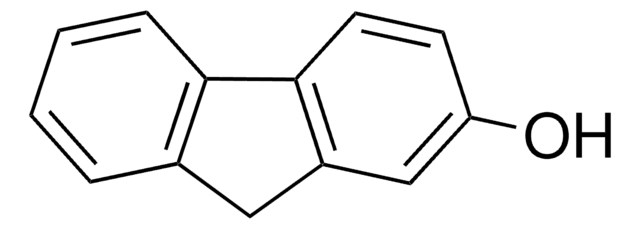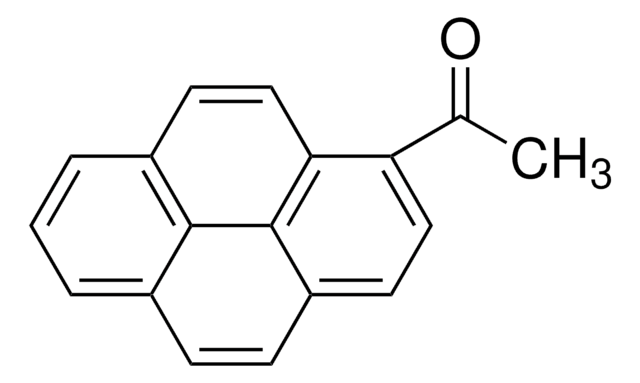All Photos(1)
About This Item
Empirical Formula (Hill Notation):
C16H10O
CAS Number:
Molecular Weight:
218.25
MDL number:
UNSPSC Code:
12352100
PubChem Substance ID:
NACRES:
NA.22
Recommended Products
Assay
98%
mp
179-182 °C (lit.)
SMILES string
Oc1ccc2ccc3cccc4ccc1c2c34
InChI
1S/C16H10O/c17-14-9-7-12-5-4-10-2-1-3-11-6-8-13(14)16(12)15(10)11/h1-9,17H
InChI key
BIJNHUAPTJVVNQ-UHFFFAOYSA-N
Looking for similar products? Visit Product Comparison Guide
Related Categories
General description
1-Hydroxypyrene, as a urinary metabolite, is a marker of polycyclic aromatic hydrocarbons (PAH) exposure. 1-Hydroxypyrene is an important biomarker of exposure to pyrene.
Application
1-Hydroxypyrene is suitable for use in following studies:
- To investigate the fast detection and quantification of 1-hydroxypyrene in tissue extracts from Nereis diversicolor exposed to sediment-associated pyrene by a simple fluorometric method.
- To investigate the effects of genetic polymorphisms of the cytochrome P450 1A1 (CYP1A1) and 2E1 (CYP2E1) and glutathione S-transferases mu (GSTM1) and theta (GSTT1) on urinary 1-hydroxypyrene and 2-naphthol levels in aircraft maintenance workers.
- To examine the the PAH exposure of cokery workers in an Estonian oil shale processing plant.
Storage Class Code
11 - Combustible Solids
WGK
WGK 3
Flash Point(F)
Not applicable
Flash Point(C)
Not applicable
Personal Protective Equipment
dust mask type N95 (US), Eyeshields, Gloves
Certificates of Analysis (COA)
Search for Certificates of Analysis (COA) by entering the products Lot/Batch Number. Lot and Batch Numbers can be found on a product’s label following the words ‘Lot’ or ‘Batch’.
Already Own This Product?
Find documentation for the products that you have recently purchased in the Document Library.
Customers Also Viewed
F J Jongeneelen
Toxicology letters, 72(1-3), 205-211 (1994-06-01)
A biomarker of human exposure to chemical agents provides a valuable parameter for assessing the extent and significance of the uptake by giving a measurement that is direct and integrated over time and exposure routes. Urinary 1-hydroxypyrene is currently tested
Ase M Hansen et al.
International journal of hygiene and environmental health, 211(5-6), 471-503 (2008-01-29)
A total of 132 studies were identified, of which 25 studies addressed environmental exposure to polycyclic aromatic hydrocarbons (PAHs) in the general population. Of these 9 studies included children. Of 101 studies among workers in various occupations, 32 studies were
Hueiwang Anna Jeng et al.
Journal of hazardous materials, 244-245, 436-443 (2013-01-15)
The objective of the cross-sectional study was to assess whether exposure to polycyclic aromatic hydrocarbons (PAHs) from coke oven emissions contributed to alteration of semen quality and sperm DNA integrity in nonsmoking workers. Nonsmoking coke oven workers from a steel
Jena Webb et al.
International archives of occupational and environmental health, 91(1), 105-115 (2017-09-25)
Polycyclic aromatic hydrocarbons (PAHs) are contaminants with carcinogenic effects but little is known about their presence in environments surrounding oil drilling operations and spills or exposure levels in nearby communities. The objective of this study was to characterize PAH levels
Gustavo Faibischew Prado et al.
The Science of the total environment, 437, 200-208 (2012-09-04)
Non-mechanised sugarcane harvesting preceded by burning exposes workers and the people of neighbouring towns to high concentrations of pollutants. This study was aimed to evaluate the respiratory symptoms, lung function and oxidative stress markers in sugarcane workers and the residents
Our team of scientists has experience in all areas of research including Life Science, Material Science, Chemical Synthesis, Chromatography, Analytical and many others.
Contact Technical Service















